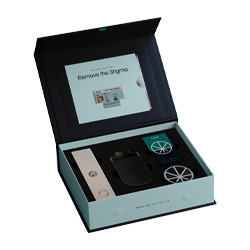The majority of the global population have a healthy relationship with food, but the scourge of eating disorders is on the rise, with millions worldwide facing anorexia, bulimia, and other disordered eating behaviours. In the UK alone, current estimates suggest that around 1.25 million people are affected by some type of eating disorder.
The three most common eating disorders are
- Anorexia nervosa – excessive fear of gaining weight and a distorted body image, leading to extreme restriction of food intake.
- Bulimia – a cycle of binge eating followed by purging and/or extreme food restriction.
- Binge-eating disorder (BED) – recurring, pervasive periods of overeating to the point of being uncomfortably full, often with a sense of loss of control.
So, let's have a look at all the available studies, and see exactly what the science is saying regarding medical cannabis and eating disorders.
Medicinal cannabis for eating disorders
Cannabis is a fascinating, complex plant that produces a range of compounds that have the ability to interact with the human body and modulate a variety of physiological processes, including hunger and satiety.
The endocannabinoid system (ECS)
The two main compounds in cannabis that have been studied for their potential therapeutic effects are THC and CBD, both of which are classed as phytocannabinoids. Our own bodies also produce cannabinoids, known as endocannabinoids, which interact with receptors throughout our brain and body to regulate a wide variety of functions. It is this similarity between the cannabinoids produced within our bodies, and the ones from cannabis, which allow us to take advantage of the potential therapeutic effects of cannabis.
The cannabinoid receptors are part of the endocannabinoid system (ECS), a molecular system that helps to maintain homeostasis (balance) throughout the body, as well as regulating psychological functions such as learning, memory and emotion. When we ingest cannabis products, the phytocannabinoids interact with the cannabinoid receptors, influencing our physiological and psychological processes.
Studies have found that THC may stimulate appetite (with anecdotal evidence of cannabis producing the ’munchies’ being well documented), while CBD has been shown to potentially decrease anxiety levels and reduce food cravings. This suggests that medicinal cannabis could possibly be beneficial in the treatment of eating disorders, as it may help regulate appetite and emotional response to food.
But how does this work for people battling eating disorders?
Well, we are not exactly sure just yet. But, research is being conducted, and the results look to be promising.
Hunger and appetite are terms used interchangeably in everyday life, but they have two separate and distinct meanings. Hunger is a physical sensation of the need for food, whereas appetite is an emotional reaction to food. Therefore, for medicinal cannabis to be effective in treating certain eating disorders, it needs to be able to modify both hunger and appetite.
This is due to the fact that people suffering from anorexia still feel the sensation of being hungry, but they make the decision to ignore it. It is no good to just stimulate the hunger sensation if you are not able to modulate the individual’s emotional response to food. In order for a treatment plan to be effective, it needs to be tailored to the individual’s own needs and circumstances.
A 2017 study, titled "The Impact of Δ9-THC on the Psychological Symptoms of Anorexia Nervosa: A Pilot Study", looked at the effectiveness of low doses of THC in improving the way patients perceived their eating behaviour. While small in scope (only nine participants), the results were very promising. After 3 weeks of treatment – 1 mg of THC per day for the first weeks, and then 2 mg per day for the next two weeks – substantial progress was found in self-reported body care, sense of ineffectiveness, depression, and asceticism. The study concluded that THC may be an "effective component in treating the psychological symptoms of anorexia”
When it comes to CBD, there have unfortunately been no peer-reviewed studies exploring the potential role of CBD in treating anorexia or bulimia thus far, but that is not to say that CBD cannot be beneficial for ED sufferers.
CBD has been shown to potentially reduce anxiety, one of the primary triggers for forms of disordered eating. CBD may also help to reduce stress levels by increasing serotonin production, which may be a contributing factor to the development of an eating disorder.
Binge-eating disorder (BED) is, of course, a totally different matter. Essentially the opposite of anorexia, and so it must be treated differently. One interesting study from the University of Helsinki looked at how CBD may modulate the reward-response mechanism in rats. CBD had already been shown to reduce the self-administration of cocaine, morphine, alcohol, and sucrose in rodents, but no studies had investigated if this effect is also related to overeating.
The researchers offered the rats the choice between regular feed, and a high-energy diet (high in fat). It found that “the acute systemic administration of CBD reduces high-energy diet intake”, suggesting that it may help reduce the cravings that BED sufferers feel, but also concluded that more research was needed before any definite conclusions could be made.
Other factors to consider
While sometimes wrongly, even deceptively touted as a magic cure-all, medicinal cannabis is just one of many potential treatments for eating disorders. The full range of treatments must include medical, psychological, and nutritional interventions. Furthermore, the administration of medicinal cannabis should not be seen as a simple substitute for established therapies, but as a complementary addition to them.
The side effects of THC may include:
- increased heart rate
- increased anxiety (at higher doses)
- dry mouth
- red eyes
- psychosis (in rare cases)
CBD also comes with some possible side effects that prospective patients should be aware of:
- gastric discomfort
- fatigue
- dry mouth
- low blood pressure
- it may negatively interact with prescription medications
It is also important to fully grasp that the effectiveness of medicinal cannabis can be affected by how you administer it, your personal tolerance to THC and CBD, and the dosage size.
With all of this in mind, it should come as anything but a surprise that the need to consult with a registered medicinal cannabis doctor is paramount before you consider making any changes to your current treatment plan, no matter if you are suffering from an eating disorder or any other medical condition.
By doing so, you can ensure that the treatment plan set out for you is tailored to your individual needs and will have the highest chance of success.
The wrap up
Although the benefits of administering medicinal cannabis as part of a comprehensive treatment plan for eating disorders cannot be fully endorsed just yet, the potential is certainly there. It is critical to remember, however, that medicinal cannabis should not be seen as a substitute for established therapies, but rather as an addition to them.
If you would like to contact a doctor registered to prescribe medicinal cannabis, to discuss if it could be beneficial for yourself or your loved one, then feel free to contact us here at Releaf for more information. We offer one of the few comprehensive medicinal cannabis services in the UK, from your first consult, through the prescription process, right up to you receiving your medication, and then continued clinical care to ensure the best possible outcomes are achieved.
Releaf understands the importance of medical cannabis in treating various medical conditions. With our tailored monthly packages, specialist consultations for medical cannabis, and a unique medical cannabis card for protection, you can access the treatment you need without worrying about the stigma.



